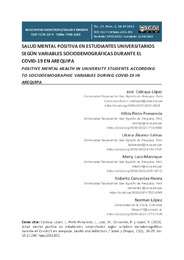Please use this identifier to cite or link to this item:
https://hdl.handle.net/11000/29853Full metadata record
| DC Field | Value | Language |
|---|---|---|
| dc.contributor.author | Calizaya-López, José | - |
| dc.contributor.author | PINTO POMAREDA, HILDA LIZBETH | - |
| dc.contributor.author | ALVAREZ SALINAS, LILIANA ROSARIO | - |
| dc.contributor.author | Lazo Manrique, Merly Clariza | - |
| dc.contributor.author | CERVANTES RIVERA, ROBERTO | - |
| dc.contributor.author | Lopez, Norman | - |
| dc.contributor.other | Departamentos de la UMH::Psicología de la Salud | es_ES |
| dc.date.accessioned | 2023-10-30T09:40:44Z | - |
| dc.date.available | 2023-10-30T09:40:44Z | - |
| dc.date.created | 2023-07 | - |
| dc.identifier.citation | Revista Health and addictions/salud y drogas Vol. 23, nº2 (2023) | es_ES |
| dc.identifier.issn | 1988-205X | - |
| dc.identifier.issn | 1578-5319 | - |
| dc.identifier.uri | https://hdl.handle.net/11000/29853 | - |
| dc.description.abstract | Introducción. El cambio en el sistema educativo por Covid-19 desencadenó efectos negativos en la salud mental, sin embargo, desde el enfoque de la psicología positiva existe una explicación para entender cómo las personas pue- den desarrollar actitudes positivas para hacer frente a las adversidades.Objetivo. Se analizó la salud mental posi- tiva en estudiantes universitarios según variables sociodemográficas durante el Covid-19 en la ciudad de Arequipa, Perú. Método. Estudio descriptivo, cuantitativo, transversal; participaron 2236 estudiantes universitarios a quienes se les registró información sociodemográfica (edad, sexo, estado civil, ocupación, tipo de familia, religión y área de estudios), utilizándose el instrumento de medición validado para determinar el nivel de salud mental positiva. Se efectuaron análisis estadísticos no paramétricos para la comparación de datos (U de Mann Whitney, Kruskal Wallis). Resultados. Se encontró nivel medio de Salud Mental Positiva (84.7%), en la capacidad de adaptación los estudian- tes presentaron nivel medio (50.4%); en la satisfacción personal y autonomía presentaron nivel alto (44.7%) y en la dimensión tolerancia a la frustración nivel medio (44.7%). Además, el comportamiento de la Salud Mental Positiva difirió de acuerdo con las variables sociodemográficas sexo, edad, estado civil, tipo de familia, ocupación, religión y área de estudios (p< 0.05). Conclusiones. Los estudiantes universitarios presentaron dificultades para adaptarse a los nuevos cambios originados por el Covid-19, demostrando fortaleza en la satisfacción personal; considerando que la mayoría de los estudiantes aún frente a dificultades como la pandemia desarrollaron la autonomía, presen- tando problemas para ser tolerantes a la frustración. | es_ES |
| dc.description.abstract | Introduction. The change in the educational system due to Covid-19 triggered negative effects on mental health, however, from the perspective of positive psychology there is an explanation to understand how people can devel- op positive attitudes to face adversities.Objetive. Was analyzed the positive mental health in university students according to sociodemographic variables during Covid-19 in the city of Arequipa, Peru. Method. Descriptive, quan-titative, cross-sectional study; 2,236 university students participated, to whom sociodemographic information was recorded (age, sex, marital status, occupation, type of family, religion, and area of study), using the validated mea- surement instrument to determine the level of positive mental health. Nonparametric statistical analyzes were per- formed for data comparison (Mann Whitney U, Kruskal Wallis).Results. A medium level of Positive Mental Health was found (84.7%), in the ability to adapt the students presented a medium level (50.4%); in personal satisfaction and autonomy they presented a high level (44.7%) and in the tolerance to frustration dimension, a medium level (44.7%). In addition, the behavior of Positive Mental Health differed according to the sociodemographic variables sex, age, marital status, type of family, occupation, religion and area of study (p< 0.05).Conclusions. University stu- dents presented difficulties in adapting to the new changes caused by Covid-19, demonstrating strength in personal satisfaction; considering that the majority of students, even facing difficulties such as the pandemic, developed autonomy, presenting problems to be tolerant of frustration. | es_ES |
| dc.format | application/pdf | es_ES |
| dc.format.extent | 14 | es_ES |
| dc.language.iso | spa | es_ES |
| dc.publisher | Universidad Miguel Hernández de Elche | es_ES |
| dc.rights | info:eu-repo/semantics/openAccess | es_ES |
| dc.rights.uri | http://creativecommons.org/licenses/by-nc-nd/4.0/ | * |
| dc.subject | Salud mental | es_ES |
| dc.subject | psicología positiva | es_ES |
| dc.subject | estudiantes universitarios | es_ES |
| dc.subject | Covid-19 | es_ES |
| dc.subject | Mental health | es_ES |
| dc.subject | positive psychology | es_ES |
| dc.subject | university students | es_ES |
| dc.subject | Covid-19 | es_ES |
| dc.subject.other | CDU::1 - Filosofía y psicología::159.9 - Psicología | es_ES |
| dc.title | Salud mental positiva en estudiantes universitarios según variables sociodemográficas durante el covid-19 en Arequipa | es_ES |
| dc.title.alternative | Positive mental health in university students accordingto sociodemographic variables during covid-19 in Arequipa | es_ES |
| dc.type | info:eu-repo/semantics/article | es_ES |
| dc.relation.publisherversion | https://doi.org/10.21134/haaj.v23i2.852 | es_ES |

View/Open:
852-Texto del artículo-5242-1-10-20230726.pdf
562,74 kB
Adobe PDF
Share:
.png)
